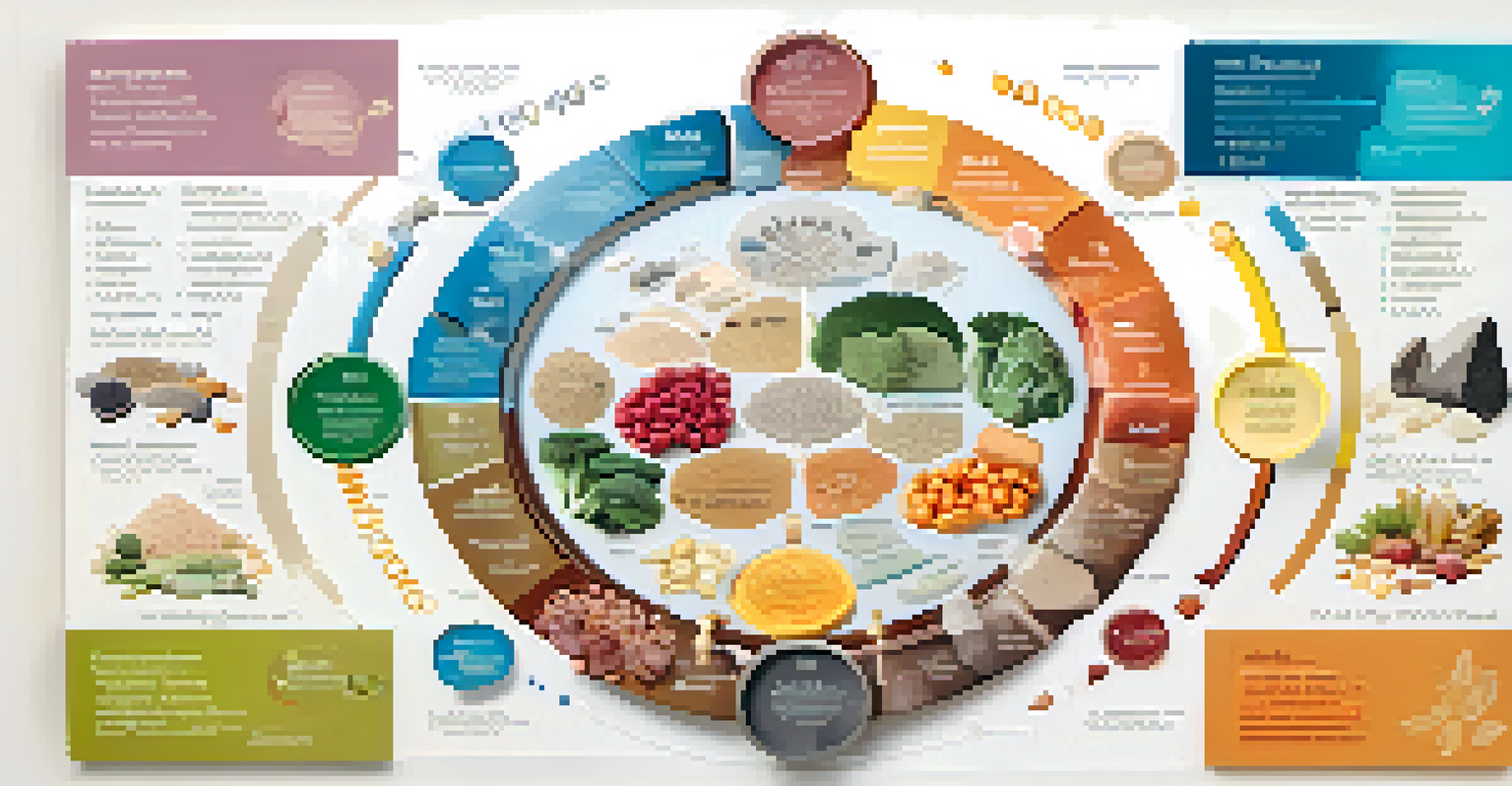The Importance of Minerals in a Balanced Diet for Wellness

What Are Minerals and Why Are They Essential?
Minerals are inorganic nutrients that our bodies need to function properly. They play a crucial role in various bodily processes, from building strong bones to regulating heartbeat. Essential minerals like calcium, potassium, and iron are vital to maintaining overall health, yet many people overlook them.
Let food be thy medicine and medicine be thy food.
Each mineral has unique functions; for instance, calcium is crucial for bone health while iron is essential for oxygen transport in the blood. Without adequate mineral intake, our bodies can suffer, leading to a range of health issues. Understanding the importance of these nutrients is the first step towards achieving wellness.
Incorporating a variety of mineral-rich foods into your diet can help meet these essential needs. Think of minerals as the tiny building blocks that support the larger structure of your health.
Key Minerals and Their Health Benefits
Some minerals stand out due to their critical health benefits. For example, magnesium helps reduce muscle cramps and supports nerve function, while potassium aids in maintaining healthy blood pressure levels. Other essential minerals like zinc are vital for a strong immune system.

Including a wide range of these minerals in your diet can enhance your overall wellness. Each mineral works synergistically with others, which means a deficiency in one can impact the effectiveness of another. This interconnectedness highlights the need for a balanced intake.
Incorporating foods such as leafy greens, nuts, and whole grains into your meals can ensure you get a healthy mix of these vital nutrients. Think of your plate as a palette where each color represents a different mineral.
The Role of Minerals in Metabolism
Minerals are not just passive players; they actively support metabolism, the process by which our body converts food into energy. For instance, chromium enhances insulin action, which helps regulate blood sugar levels. This is particularly beneficial for those managing diabetes.
You are what you eat, so don't be fast, cheap, easy, or fake.
Another example is iodine, which is crucial for producing thyroid hormones that regulate metabolism. Insufficient iodine can lead to weight issues and fatigue, underlining the importance of this mineral in our diet.
By ensuring a good intake of metabolism-supporting minerals, you can keep your energy levels steady and your body functioning optimally. Think of minerals as the catalysts that keep your body's engine running smoothly.
How Minerals Support Bone Health
Minerals like calcium and phosphorus are foundational to bone health. They work together to build and maintain strong bones, minimizing the risk of fractures and conditions like osteoporosis later in life. This is especially important for growing children and aging adults.
Vitamin D, while not a mineral itself, is crucial for calcium absorption. A diet rich in both can help strengthen bones and prevent bone-related issues. Ensuring you have a balanced intake of these elements can lead to a sturdier skeletal structure.
Incorporating dairy products, leafy greens, and fortified foods can help you meet your calcium needs. Just imagine your bones as the pillars of a building; without the right materials, they can weaken over time.
Minerals and Heart Health: A Vital Connection
Maintaining heart health is heavily influenced by mineral intake. Potassium, for instance, helps regulate blood pressure, reducing the risk of heart disease. Magnesium also plays a protective role by preventing abnormal heart rhythms.
Conversely, a diet high in sodium can lead to increased blood pressure, which is detrimental to heart health. It's essential to balance sodium intake with heart-healthy minerals to support cardiovascular wellness.
Foods like bananas, avocados, and beans are excellent sources of potassium. Think of them as your heart's allies, working tirelessly to keep your cardiovascular system in check.
The Consequences of Mineral Deficiencies
Ignoring the importance of minerals can lead to significant health issues. Deficiencies in essential minerals can result in symptoms ranging from fatigue and weakness to more severe conditions like anemia and bone disorders. For example, a lack of iron can lead to anemia, causing tiredness and low energy.
Moreover, mineral deficiencies can impact mental health, leading to issues like anxiety and depression. Ensuring a balanced intake can help mitigate these risks, promoting both physical and mental well-being.
Regularly including a variety of mineral-rich foods in your diet can prevent these deficiencies. Just like a car needs the right fuel to run efficiently, your body requires a steady supply of minerals to function at its best.
Tips for Incorporating Minerals into Your Diet
Adding minerals to your diet can be simple and enjoyable. Start by diversifying your plate; include a variety of fruits, vegetables, whole grains, and lean proteins. Each food group offers a unique blend of minerals that can contribute to your overall health.
Cooking methods also matter—steaming vegetables helps retain their mineral content better than boiling. Additionally, consider snacking on nuts and seeds, which are packed with essential minerals and make for a healthy, convenient option.

Finally, reading nutrition labels can help you make informed choices. Think of it as a treasure map leading you to the mineral-rich foods that can enhance your well-being.